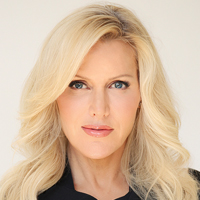Editor’s note: Kimberly Foss is a longtime columnist with Rethinking65. To read more of her columns, click here.

Maybe you’ve seen it recently: A woman newly widowed or newly divorced sits across from you with the expression of a deer trapped in the headlights of an oncoming vehicle. As a financial advisor who is also a single mom, I have vivid memories of so many conversations with women confronting the fresh burden of handling their own finances for the first time.
For some, the grief of bereavement is all-encompassing. You may hear phrases like, “He always made the financial decisions,” or “I don’t know what to do with all this.” For others, anger and betrayal have taken center stage as they grapple with the ending of a marriage and, all too often, the unwelcome news of debt accumulated by the ex-spouse.
Perhaps your prospect or client is among the rising number of women who have made the decision to end marriages that have lasted thirty or more years — the so-called “gray divorce” trend. In fact, recent research by AARP indicates that 66% of divorces involving women 50 and older were initiated by the wives, not the husbands. The problem is, even when the divorce is the woman’s choice, her finances are much more likely to be severely disrupted than her ex-husband’s.
The Wealthiest Women Are Often Least Prepared
At some point, many of us will find ourselves in the position of offering counsel and guidance to women who are jolted, whether by their choice or someone else’s, into managing and making decisions about their financial affairs. Whether because of divorce or bereavement, landing in this unexpected, unplanned-for position with little or no preparation can put them at risk financially and emotionally.
Recent studies by the American Psychological Association indicate that women in general are far more likely than men to feel stress over money matters, including worries about being prepared for retirement. Add to that the sudden, intense stress created by divorce or the death of a spouse, and it’s no wonder that women struggle with assuming responsibilities completely unfamiliar to them.
Despite the gains women have made in education and careers, those in wealthier households are more likely to leave the finances up to their spouses. Among 90% of households in the top 1% of net worth, the husband was designated as “most knowledgeable” about finance, according to a study conducted at Ohio State University. In other words, the women who potentially have the greatest chance of having their lifestyles drastically affected by financial decisions are often the least capable of assuming management of their financial affairs.
But it doesn’t have to be this way.
Talking It Through
There are concrete steps women can take to regain their financial equilibrium, even after the drastic shifts imposed by bereavement or divorce. By providing the right kind of help and advice, you can assist them in charting a more confident path forward. Here are four starting points:
1. Help Them Figure Out the Debt
Too often, women who are suddenly single learn about debts taken on by a deceased or divorced partner. While many state laws provide some protection to widows for certain types of debt incurred by their deceased partners, how the responsibility for debt is divided up in a divorce can be more problematic.
Beyond the credit cards, women should also obtain an accounting of obligations like second liens on the home, loans against 401(k)s or other retirement plans, and other non–credit card debt. Debt will have to be addressed — either during a divorce settlement or while probating a late spouse’s will. Therefore, we need to do our best to help our clients have accurate knowledge going in, so they will be able to make informed decisions about how assets will be allocated.
2. Help Them Consider Work Options
Returning to work or becoming the primary breadwinner can be a tough adjustment, especially for women accustomed to staying at home during a marriage. As a fiduciary, you can help them analyze their cash flow and compare it with their financial obligations to help them get a clear picture of how much income they’ll need to keep their household budget balanced. This should be among your first conversations, especially for younger widows or divorcees with children still at home,.
3. Help Them Assess Whether to Keep or Sell the House
For many families, their home is their most valuable asset. But hanging onto it may not always be in the newly-single woman’s best financial interest. You need to help them look at the level of debt vs. equity. Be sure they include home equity lines of credit (HELOCs) or second mortgages in this assessment. You should also remind them that to make a good decision they will need to factor in the expense of necessary upkeep on a home and their housing needs.
For widows, much will depend on the size of the estate, any provisions the deceased spouse made for liquidation of the mortgage and other debt, and their projected future-income needs. For example, the proceeds from the sale of a home could free up significant funds for investment and future income.
If your client is going through a divorce, you should advise them to obtain an independent appraisal of the home’s value to ensure a fair division of the marital estate.
4. Help Them Understand Social Security and Other Benefits
We need to help widows determine whether they qualify for survivor benefits from Social Security. Their dependent children may qualify for survivor benefits until they reach age 18. Older widows (from age 62 up) may be eligible to file for monthly Social Security income benefits based on their deceased spouse’s earnings record.
If the deceased spouse had a pension plan, the widow may also qualify for additional benefits. If the husband had a 401(k) plan, the widow may be the beneficiary of that plan and entitled to the proceeds. Advisors should also help clients track down and evaluate the deceased spouse’s IRAs and life insurance policies. Additional accidental death benefits may apply depending on the circumstances of the spouse’s passing.
Older divorcées may also be able to file for spousal Social Security benefits based on their ex-husband’s earnings record. We should also counsel divorcing women to find out about any retirement or pension plans, since these are subject to division between the parties as part of a divorce settlement. This is especially important for newly-single women, because women often have less retirement savings than their male counterparts. Part of this is due to the continuing gender-based wage gap. Retirement-savings shortfalls are compounded for women because they have statistically longer lifespans than men.
Getting Started
As you can see, there are practical measures you can take to assist women who are assuming responsibility for their finances for the first time. Breaking the process down into steps like these, and focusing on each one in turn, can help your clients clear the fog that typically accompanies divorce and widowhood. You can help provide women with a feeling of progress and control as you help them negotiate the difficult early days.
Kimberly Foss, CFP®, CPWA, is a senior wealth advisor with Mercer Advisors, practicing in the Sacramento Valley area. The opinions expressed by the author are her own and are not intended to serve as specific financial, accounting or tax advice. Mercer Global Advisors Inc. is registered with the SEC and delivers all investment-related services. Mercer Advisors Inc. is a parent company of Mercer Global Advisors Inc. and is not involved with investment services. Click here for a full disclaimer.







